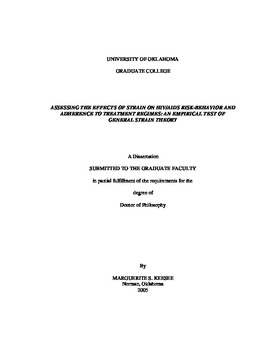Assessing the effects of strain on HIV/AIDS risk-behavior and adherence to treatment regimes: An empirical test of general strain theory.
Abstract
The purpose of this study is to determine the social and social psychological factors that are significantly related to an individual's ability to adhere to HIV medical regimens and involvement in high-risk behaviors which could lead to further transmission of HIV and other opportunistic infections (OIs). The ability of Agnew's general strain theory (GST) to explain HIV/AIDS treatment non-adherence and risky behaviors was specifically tested. Adherence is crucial to maintain low viral loads and prevent the development of a drug resistant-virus. Involvement in high risk behavior further complicates successful adherence to medical regimes and the overall treatment of HIV/AIDS. Overall the known factors associated with behavioral and medical non-adherence to HIV/AIDS treatment regimens are compatible with a GST theoretical model. Specifically tested in this study was the applicability of Agnew's (1992) General Strain Theory of Crime and Delinquency in explaining both medical and behavioral non-adherence to HIV/AIDS treatment regimens in a Hispanic population residing along the U.S.-Mexico International Border. Overall, the findings from this study did not support the use of GST in explaining non-adherence and involvement in risk behaviors which may be in part due to sample size limitations. However, important components of the theory proved useful and findings suggest that further research is needed using GST and other criminological theories including social and self-control and differential association to further our understanding of medical adherence and involvement in high-risk behaviors.
Collections
- OU - Dissertations [9426]
